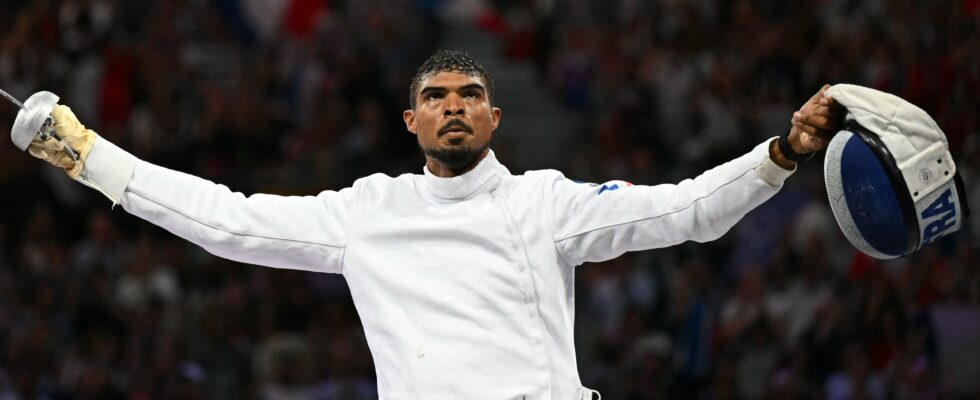8,000 people are silent. Only the sound of the irons crossing splits the air. Oxygen more and more unbreathable. Shrill slide of the tennis shoes on the parquet. A rumor. Then the flash, a sword blow in the bust. Green light. General sigh of desolation. The Grand Palais disconnects. Yannick Borel is only in silver. An immense feat in the image of the stature of the fencer, who peaks at 1 meter 96. But the Japanese Koki Kano, third in the world, a sort of metronome knight all in ripostes and serenity, got the better of the power of the Guadeloupean and his great uncompromising gestures. Not resentful, the public already sings consoling “Yannick”, in cadence.
Magnificent performance despite the failed revenge: in Tokyo, during the previous Olympics, the Asian, then at home, had already demolished Borel to offer his country the Olympic team gold. For a long time, during this day, the Frenchman seemed galvanized by this ecstatic audience, clenching his fist after each beautiful touch, between two Marseille womenThe dome of the Grand Palais is 45 metres high; the cheers from the two stands, arranged only at height, wonderfully fill the space under the glass roof, with electric intensity.
Fencing is an exciting sport. Especially because all surprises are possible, matches are often played with a decisive touch, during “sudden death”. On the French team’s side, we must maintain a tradition of excellence in fencing, the discipline is the one that has given the most Olympic medals to the French sport, with 124 trinkets. French remains the official language of the discipline, so much so that between each touch, the referees declaim “en garde, allez” often tinged with a delicious accent.
Yannick Borel, unexpected hero
This Sunday, July 28, we are expecting Romain Cannone, reigning Olympic champion, fifth in the world, he disappears in the round of 16 against an unknown Kazakh. The beauty and cruelty of the Olympic tournaments; if some stars hold their own, like the swimmer Léon Marchand, whose announcement of the gold medal provokes the delights of the Grand Palais, some media statuses evaporate in an instant when unknown faces emerge, like Auriane Mallo-Breton, silver medalist fencer, who came within a touch of gold, this Saturday.
Yannick Borel, whose large frame seems perfectly adapted to the immensity of the place, poses as an unexpected hero. This customs officer in the city has advanced quietly. At 35, he is the Olympic team champion in 2016 but has not won a major individual title since 2018. In 2023, he had to take a five-month break due to a broken leg. In June 2024, another thigh injury, withdrawal from a pre-Olympic tournament, worry. No one sees him as a medalist, they are counting on him for the team event. But he claims a steely mind.
In the quarter-finals, he narrowly escaped elimination on the sly, against the Japanese Masaru Yamada. 12-11 in sudden death, carried by an already furious crowd. The semi-final, against the Egyptian Mohamed Elsayed, already tells a story of revenge. In Tokyo, in the individual, his opponent beat him to everyone’s surprise, before imitating the celebration of the footballer Cristiano Ronaldo. Elsayed offers a whimsical, expressive fencing, his very theatrical attacks-dodges evoke the little devil who comes out of his box or the cartoon character trying to zigzag in a field of banana skins. Borel opposes him with an unfailing placidity. The scene repeats itself, three, four, five times: he lets his competitor advance, move everywhere, to place at the opportune moment a single riposte that immediately hits the mark. The one nicknamed “the lion”, according to the International Fencing Federation website, has the manners of a hippogriff. He looks at his opponent before pushing him away with a blow of his paw. At each French touch, the audience roars, in the same feline spirit.
Fencing is a beautiful sport
Even the Egyptian’s fantasies – he changes swords, dives two metres from the ring, complains about his arm, each time leading to a long pause – do not in any way erode the superiority of Yannick Borel, who is, it must be said, experienced in acting since he trained the actors of Three Musketeersincluding François Civil, Vincent Cassel and Romain Duris. When he scored his last touch, a 15-9 victory, he dropped his iron mask, then turned, his face furious and his fist clenched, towards these stands which only asked for communion in the din.
Koki Kano, who heads the Frenchman, is an opponent of a different caliber, lively, agile and patient. Yannick Borel, who started fencing at the age of ten, because Zorro inspired him and karate was not offered in his school in Guadeloupe, rushes to the attack as if to fight. The match only takes place in his opponent’s zone. Error, the little Japanese is a formidable counter, a fighter in defense, who loves nothing more than to place the lethal riposte after having crossed swords. 3-2 after the first three-minute round, 9-5 after the second, the Asian dominates.
The last round is just a formality, the Japanese enjoys the panache of his duelist. 14-9, and Yannick Borel, a tired hippogriff, rushes to the board one last time. Parry, blow to the chest, the response lasted only a moment. We open our eyes again, and Koki Kano grabs a Japanese flag, with its heart red like the light of the Frenchman, which we have not seen light up enough in the final. The public, obviously disappointed, politely applauds the talent. Before giving a nice ovation to Yannick Borel, his unfortunate hero of the day. Fencing is a beautiful sport.
